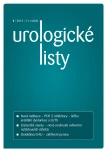-
Medical journals
- Career
Laparoscopis nephrectomy for atrophic kidney with serious infectious episode
Authors: H. Yanaihara
Published in: Urol List 2013; 11(1): 23-26
Overview
Recently, laparoscopic procedures are applied to any surgical situations with the improvement of techniques and devices. However, laparoscopic nephrectomy for atrophic kidney with serious infectious episode is still a challenging procedure with high rate of open conversion and blood transfusion because of unpredictable perinephric inflammatory change. Unfortunately this procedure is not common in daily practice. Therefore, there are only a few reports of nephrectomy itself, and futhermore the standard management of the patient has never been summarized. First of all, key step would start from the control of infection. The choice of nephrectomy or ureteral stent would not be a matter. The patient would be better to spend a month daily life after complete remission of infection before nephrectomy. Transperitoneal approach is personally recommended but retropeitoneal approach can be chosen for certain cases. Surgical procedure should be done meticulously more than usual and sometimes brave decision could be required to find break-through. Once all procedure has been accomplished, postoperative course is usually favorable. Laparoscopic nephrectomy for atrophic kidney with serious infectious episode may be difficult. However, reported operation time is comparable to laparoscopic radical nephrectomy. This procedure could be the first choice for the experienced surgeon and should be always included in the choice for any surgeons.
Key words:
laparoscopic nephrectomy, atrophic kidney, infection
Sources
1. Shekarriz BS, Meng MV, Lu HF et al. Laparoscopic nephrectomy for inammatory renal conditions. J Urol 2001; 166(6): 2091–2094.
2. Katz R, Pode D, Golijanin D et al. Laparoscopic nephrectomy for infected,obstructed and nonfunctioning kidneys. Surg Laparosc Percutan Tech 2004; 14(6): 340–343.
3. Manohar T, Desai M, Desai M et al. Laparoscopic nephrectomy for benign and inammatory conditions. J Endourol 2007; 21(11): 1323–1328.
4. Duarte RJ, Mitre AI, Chambô JL et al. Laparoscopic nephrectomy outside gerota fascia for management of inflammatory kidney. J Endourol 2008; 22(4): 681–686.
5. Tobias M, Lasmar MT, Batista LT et al. Laparoscopic nephrectomy in inammatory renal disease: proposal for a staged approach. Int Braz J Urol 2005; 31(1): 22–28.
6. Sugihara T, Yasunaga H, Horiguchi H et al. Does Mechanical Bowel Preparation Improve Quality of Laparoscopic Nephrectomy? Propensity Score-matched Analysis in Japanese Series. Urology 2013; 81(1): 74–79.
7. Yanaihara H, Sakamoto F, Matsushima M et al. Clinical assessment of perioperative course of patients undergoing laparoscopic nephrectomy or adrenalectomy without perioperative bowel management. Hinyokika Kiyo 2011; 57(8): 407–409.
8. Khaira HS, Shah RB, Wolf JS. Laparoscopic and open surgical nephrectomy for xanthogranulomatous pyelonephritis. J Endourol 2005; 19(7): 813–817.
9. Arvind NK, Singh O, Ali Q et al. Laparoscopic nephrectomy in xanthogranulomatous pyelonephritis: 7-year single-surgeon outcome. Urology 2011; 78(4): 797–801.
Labels
Paediatric urologist Urology
Article was published inUrological Journal

2013 Issue 1-
All articles in this issue
- The role of phosphodiesterase inhibitors in urology in treatment of erectile dysfunction
- Tadalafil in the treatment of LUTS/BPH and ED
- Management of the adult buried penis
- Varicocele and the signification of its repair
- Laparoscopis nephrectomy for atrophic kidney with serious infectious episode
- Simultaneous ipsilateral native nephrectomy with kidney transplantation for the patiens with polycystic kidney disease
- Retroperitoneal laparoscopic nephrectomy for the patients undergoing peritoneal dialysis
- Preliminary experience with transperitoneal laparoendoscopic single-site radical nephrectomy using a home-made single-port device in China
- A review of current practices and controversies in the use of indwelling ureteric stents
- Does early following PCNL lead to trapped stones in the tract: Myth or reality
- Patient preferences for advanced urological techniques: A guide to future surgical developments?
- Bipolar plasma vaporization of prostate for symptomatic large benign prostatic enlargement: two-year clinical results
- Gender as a factor influencing clinico-pathological parameters and prognosis of renal cell carcinoma
- EAU Guidelines on penile curvature
- Urological Journal
- Journal archive
- Current issue
- Online only
- About the journal
Most read in this issue- Management of the adult buried penis
- Varicocele and the signification of its repair
- EAU Guidelines on penile curvature
- A review of current practices and controversies in the use of indwelling ureteric stents
Login#ADS_BOTTOM_SCRIPTS#Forgotten passwordEnter the email address that you registered with. We will send you instructions on how to set a new password.
- Career

